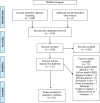Systematic review: methodological flaws in racial/ethnic reporting for gastroesophageal reflux disease
- PMID: 29444213
- PMCID: PMC6916737
- DOI: 10.1093/dote/dox154
Systematic review: methodological flaws in racial/ethnic reporting for gastroesophageal reflux disease
Abstract
Health care disparities affecting the care of multiple disease groups are of growing concern internationally. Research guidelines, governmental institutions, and scientific journals have attempted to minimize disparities through policies regarding the collection and reporting of racial/ethnic data. One area where shortcomings remain is in gastroesophageal reflux disease (GERD). This systematic review, which adheres to the PRISMA statement, focuses on characterizing existing methodological weaknesses in research focusing on studies regarding the assessment, prevalence, treatment, and outcomes of GERD patients. Search terms included GERD and typical symptoms of GERD in ethnic groups or minorities. We reviewed 62 articles. The majority of studies did not report the race/ethnicity of all participants, and among those who did, very few followed accepted guidelines. While there were diverse participants, there was also diversity in the manner in which groups were labeled, making comparisons difficult. There appeared to be a disparity with respect to countries reporting race/ethnicity, with certain countries more likely to report this variable. Samples overwhelmingly consisted of the study country's majority population. The majority of studies justified the use of race/ethnicity as a study variable and investigated conceptually related factors such as socioeconomic status and environment. Yet, many studies wrote as if race/ethnicity reflected biological differences. Despite recommendations, it appears that GERD researchers around the world struggle with the appropriate and standard way to include, collect, report, and discuss race/ethnicity. Recommendations on ways to address these issues are included with the goal of preventing and identifying health care disparities.
Figures
References
-
- Smedley B D, Stith A Y, Nelson A R. Unequal treatment: confronting racial and ethnic disparities in health care. In: Smedley B D, Stith A Y, Nelson A R (eds). Unequal Treatment: Confronting Racial and Ethnic Disparities in Health Care. Washington DC: 2002 by the National Academy of Sciences, 2003.
-
- World Health Organization Health and freedom from discrimination. Human Rights Publication Series 2. 2001.
-
- Centers for Disease Control and Prevention Atlanta, Ga CDC health disparities and inequalities report: United States 2013. In MMWR 2013; 62(Suppl 3): 2013.
-
- Helms J E, Jernigan M, Mascher J. The meaning of race in psychology and how to change it: a methodological perspective. Am Psychol 2005; 60: 27. - PubMed
-
- Health NIo NIH Policy on Reporting Race and Ethnicity Data: Subjects in Clinical Research (NOT-OD-01-053). http://grants.nih.gov.turing.library.northwestern.edu/grants/guide/notic... [Accessed August 14, 2017] 2001.
Publication types
MeSH terms
Grants and funding
LinkOut - more resources
Full Text Sources
Other Literature Sources
Medical


